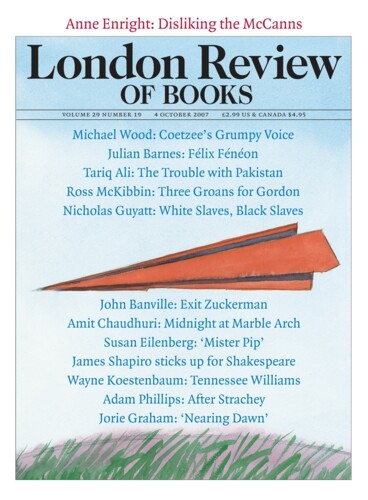In the days before office life was subverted by the cult of personality, your average working stiff was always looking for ways to be out of contact. Phones were left off the hook, smokers popped down to the mailroom, phantom meetings were arranged in mystery locations across town, time-serving professionals sat alone on park benches and secretaries were regularly entreated by semaphore to deny one’s availability. That was in the lazy, hazy days before the mobile phone. Nowadays, being unavailable is understood to be an act of aggression equal to driving tanks through the walls of the Danzig Post Office. To fail to answer your mobile phone, or to turn it off completely, is merely to announce that you are deep in the throes of a secret life. You don’t care, you’re not reliable, you’ve got something to hide, you’re screening. There are few modern crimes so remarked on as the crime of unavailability. Answer or you’re evil. Answer or you’re dead.
The telecommunications industry has been hard at work in recent years to wipe unavailability from the face of the planet. It started with answering services, the point of which was to end the dishonest practice of letting phones ring and ring – or ‘ring out’, as they say in Scotland. One was suddenly expected to ‘answer’ these messages and the art of not allowing people to get through was wiped out overnight. The sad litany of subsequent inventions – mailboxes, email, pagers, texts – culminated in the arrival of the Witchfinder General of such life-altering kit, the one that would wipe away the filth of unavailability once and for all. Suspect device: the Blackberry.
Before I became the Elizabeth Taylor of the telecommunications universe, I had loved being out of contact. I wandered round galleries and read books at the edge of lakes. I ruminated on trains. I slept all night. Then, one day, I realised something that other people had realised long before me: there was no way to prove one was alive and useful if one wasn’t totally available all round the clock. It took me a while to understand: I’m available, therefore I am. Now my pager would vibrate reassuringly in my pocket during the latest show at the Donmar Warehouse. And mobiles too suddenly acquired a buzz setting; even when it was too embarrassing to have a gadget make a sound you could know that people wanted you. And one could ignore it for a while and go on watching the play, secure in the knowledge that nobody could ever imagine one was too absorbed in anything to be told that the world still cared.
Everybody who really understands the Blackberry calls it a Crackberry, which underestimates its addictive properties. At least with crack you get to tilt your head back between puffs, or so my mother tells me. In any event, it’s the night-time that is really difficult: to turn it off is to accept that sleep is a sort of death, and to leave it on is to wonder all night what that crucial stuff must be (Australian gossip? American film rights? Adverts for Xanax?) that keeps the thing buzzing in the next room like there’s no tomorrow.
And then, of course, there is no tomorrow: one is so tired from being available that one is not available the following day for normal tasks. Maybe – one says to oneself in a moment of complete madness – it would be possible to spend a day just writing or getting on with stuff that didn’t involve other people’s sense of what you should be thinking about at any given moment. Maybe one could contemplate an hour or so without the interruptions directly attendant on one’s need to be needed? I was considering telecom rehab after a holiday in Cornwall during which my family threatened to throw my Crackberry into the sea. ‘What do you mean, the sandcastle needs more wet sand? I’ve got a message here from Argos that says they have 40 per cent off shoe racks for the months of August and September!’
My name’s Andrew, and I’m a reachaholic. Through the fellowship of other sufferers I’ve come to see there are worse things than not being available for entire stretches of 15 minutes. I’m taking it one day at a time, but I know I am powerless before the influence of buzzes and pings, and with the help of my Higher Power I hope to inhabit the necessary silences of life with an easier heart. But to be quite frank, the gadgets industry is not proving very helpful in my quest for peace and quiet. It’s Happy Hour every minute of the day up the high street, especially now that Carphone Warehouse have won the exclusive contract to retail the new iPhone – hardcore gut-rot for reachaholics of all classes. And don’t even get me started on Facebook, the last circle of hell, a permanent Lost Weekend, a bottomless pit of indulgence, for those of us intoxicated by the idea that to be instantly contactable is to be resolutely alive.
Maybe I’m dead and I just don’t know it. The people I know who are on Facebook keep telling me I’m losing touch with them by not being a Face. They say I’m missing out on drinks and chats and the delicious fun of being within reach of people I haven’t seen in years and who ask that one join their Communiverse. But I’m afraid the Blackberry constitutes the outer limit of my need to be available. As a recovering addict, I feel no need for Facebook. Already I see a future of park benches and fake meetings across town stretching out before me. I see nothing but the ridiculous, anachronistic pursuit of privacy. Now, there’s a dirty word.
Send Letters To:
The Editor
London Review of Books,
28 Little Russell Street
London, WC1A 2HN
letters@lrb.co.uk
Please include name, address, and a telephone number.

